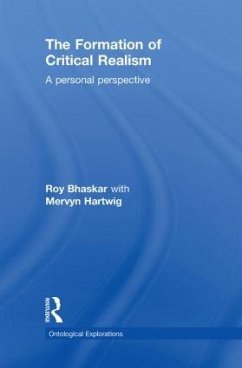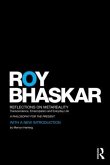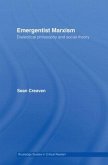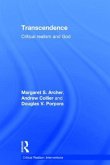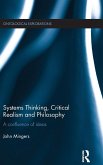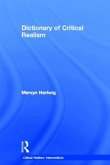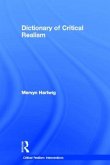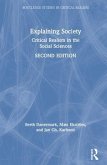This series of interviews, conducted in the form of exchanges between Roy Bhaskar - the originator of critical realism (and the later philosophy of meta-reality) - and Mervyn Hartwig, a leading commentator on critical realism, tells a riveting story of the formation and development of critical realism.
Hinweis: Dieser Artikel kann nur an eine deutsche Lieferadresse ausgeliefert werden.
Hinweis: Dieser Artikel kann nur an eine deutsche Lieferadresse ausgeliefert werden.
'The Formation of Critical Realism is one of those big little books, only 237 pages short, but full of absorbing insights, ideas and reflections, to say nothing of providing the only comprehensive overview of the critical realist project available in print, to my knowledge. Comprised of interviews between Roy Bhaskar and Mervyn Hartwig, carried out between August 2007 and March 2008, the book recounts the story of the philosophical formation of critical realism, as told by its 'chief architect'. It takes critical realism philosophically through its main phases and levels of development, including original or basic critical realism, dialectical critical realism and the philosophy of metaReality.
That such an overview of the development of critical realism is available in one volume is worth the price alone. But what makes this book particularly attractive is its promise of interweaving three unfolding and related narratives - the personal narrative of Bhaskar, a child of post-war Britain and Indian partition and independence, the intellectual narrative of the emergence and growth of critical realism, and a 'world-historical story' and discussion of the development of modernity.'
'...I found this book to be most inspiring in the sense that it revealed Bhaskar's (albeit fallible) commitment to 'walk the talk', his search for wholeness and 'unity of theory and practice', as first mentioned in the opening chapter. There are many examples of this throughout the book, including his early political activism, exploratory practice with psychoanalysis, meditation and other spiritual practices. Though the book sets out to discuss the formation of the philosophy of critical realism, I think it achieves much more than this. We see how critical realism is (or has the potential to be) a lived practice.'
-Nick Wilson, King's College, London, in the Journal of Critical Realism vol 11 iss 2 p.247-254
That such an overview of the development of critical realism is available in one volume is worth the price alone. But what makes this book particularly attractive is its promise of interweaving three unfolding and related narratives - the personal narrative of Bhaskar, a child of post-war Britain and Indian partition and independence, the intellectual narrative of the emergence and growth of critical realism, and a 'world-historical story' and discussion of the development of modernity.'
'...I found this book to be most inspiring in the sense that it revealed Bhaskar's (albeit fallible) commitment to 'walk the talk', his search for wholeness and 'unity of theory and practice', as first mentioned in the opening chapter. There are many examples of this throughout the book, including his early political activism, exploratory practice with psychoanalysis, meditation and other spiritual practices. Though the book sets out to discuss the formation of the philosophy of critical realism, I think it achieves much more than this. We see how critical realism is (or has the potential to be) a lived practice.'
-Nick Wilson, King's College, London, in the Journal of Critical Realism vol 11 iss 2 p.247-254

